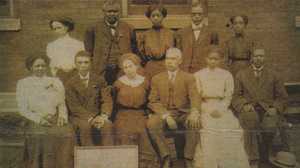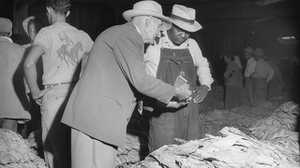Meet the Filmmakers
Partners of the Heart came to fruition more than ten years after producer/director Andrea Kalin first conceived it. Along the way, a diverse team focused its talents on recounting the inspiring and thought-provoking story of Alfred Blalock and Vivien Thomas.

Andrea Kalin, producer and director:
Andrea Kalin is an award-winning filmmaker with numerous broadcast credits related to social issues. Since 2000, her work has garnered more than thirty prestigious international awards including two Gracies, four CINEs, two EdPress Awards of Distinction, a Chris Award and a Gold Unesco medal at the NY Festivals, among others. Kalin has pioneered communication and marketing strategies to promote social change. She is the president and founder of Spark Media, a multi-media firm established in 1989.
"I think that the legacy of Partners is that it challenges you to look at your world in a different way, it challenges you to see personally how would you be able to transcend the difficulties and the challenges that a Vivien Thomas perhaps had to endure. How do you, now knowing his story, look at the political and personal legacy of racism in this country, what we were, what we would have been, what we lost. How do you see an alliance between two men as tumultuous as times as it was, how did they transcend their differences and be able to actually collectively leave something together, that was much stronger than either could have done apart. And so I think that the legacy is to have people dialogue about these issues, both the personal issues and those on a larger level, and get people to start talking about things that are difficult and raw, because if we are to overcome specifically some of the strictures and constraints that this story points to, if we are to move on from that, then we really do need to be able to confront what the story has to say."

Bill Duke, director, re-created scenes:
Bill Duke, also known as an actor and writer, has been acclaimed for his direction of a variety of feature films, including A Rage in Harlem, The Cemetery Club, Sister Act 2, and the recent crime drama Hoodlum, starring Laurence Fishburne. For television, Duke directed the CableAce winner, The Boy Who Painted Christ Black, as well as episodes of "New York Undercover," "Hill Street Blues," "Cagney & Lacey," "Miami Vice," and "Dallas." He was nominated for an Emmy for his direction of Lorraine Hansberry's A Raisin in the Sunon PBS. Other public television projects include The Killing Floor for American Playhouse and The Meeting, nominated for an NAACP Image Award.
"What interests me is the subjectivity of things, what history said happened. But then there are people who perform historical acts and what were the nuances of the individuals who were involved in this act, whether it's fictional or whether it's historical in the sense of a documentary. Watching good guys do good things and bad guys do bad things, is not very interesting to me. But seeing the good and bad guys and the bad and good guys, or not the bad, but the human frailty of the good guys, that is fascinating to me. This story shows Vivien Thomas and Alfred Blalock in all of their glory but it also shows us their frailty as human beings. I'm always focusing on where is that little scratch. Not as a negative thing but it reminds me of my own frailties. If this person is so glorious that they are unflawed, I can't possibly ever be that person because I am a flawed human being. But if they have something that's recognizable in terms of their flaws, then perhaps I can achieve what they have achieved because they are like me."

John Rhode, director of photography:
John Rhode is a seasoned director of photography with extensive credits in feature film and television. Most recently, he completed work on the films The Perfect Storm and Galaxy Quest. Rhode's other film credits include Bowfinger, Bicentennial Man and two independent films, Stanley's Gig and The Gift. His television credits include the comedy series "Coach" and "Murphy Brown."
"Another great inspiration for doing the project was using old film stocks, reversal color, black and white, and with that we could try to recapture the same sort of footage that was created back in that time period. By using a Bell and Howell camera, it was another way we could achieve that, an old Bell and Howell, DR 70 camera with old style lenses. We could vary the film rate, and go wild with it, and use the trigger and stutter the trigger. Whatever we could pull out of that camera we did. And also we scratched the film a little bit, ran it through a projector about 15--20 times and it gave it a feeling of looking back. This distinguished the recreation footage from the interview footage, which we shot on contemporary negative film stock."







